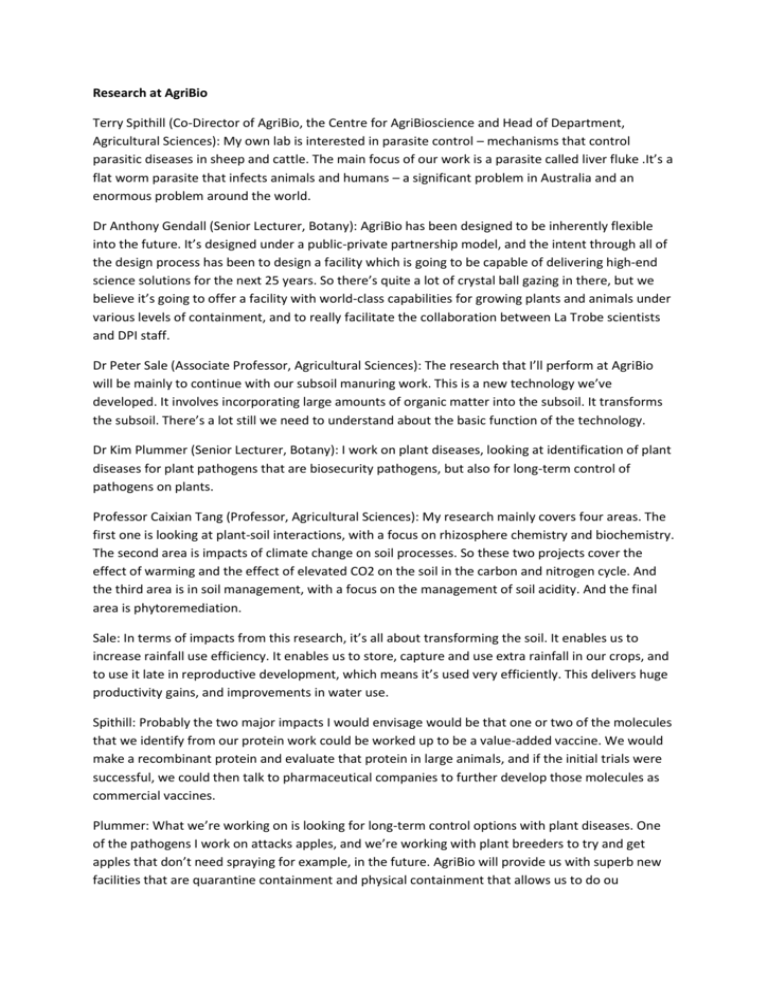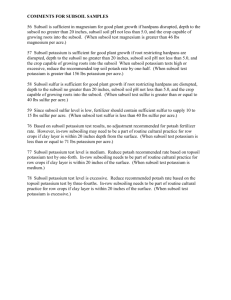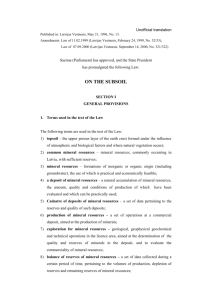Research at AgriBio Transcript
advertisement

Research at AgriBio Terry Spithill (Co-Director of AgriBio, the Centre for AgriBioscience and Head of Department, Agricultural Sciences): My own lab is interested in parasite control – mechanisms that control parasitic diseases in sheep and cattle. The main focus of our work is a parasite called liver fluke .It’s a flat worm parasite that infects animals and humans – a significant problem in Australia and an enormous problem around the world. Dr Anthony Gendall (Senior Lecturer, Botany): AgriBio has been designed to be inherently flexible into the future. It’s designed under a public-private partnership model, and the intent through all of the design process has been to design a facility which is going to be capable of delivering high-end science solutions for the next 25 years. So there’s quite a lot of crystal ball gazing in there, but we believe it’s going to offer a facility with world-class capabilities for growing plants and animals under various levels of containment, and to really facilitate the collaboration between La Trobe scientists and DPI staff. Dr Peter Sale (Associate Professor, Agricultural Sciences): The research that I’ll perform at AgriBio will be mainly to continue with our subsoil manuring work. This is a new technology we’ve developed. It involves incorporating large amounts of organic matter into the subsoil. It transforms the subsoil. There’s a lot still we need to understand about the basic function of the technology. Dr Kim Plummer (Senior Lecturer, Botany): I work on plant diseases, looking at identification of plant diseases for plant pathogens that are biosecurity pathogens, but also for long-term control of pathogens on plants. Professor Caixian Tang (Professor, Agricultural Sciences): My research mainly covers four areas. The first one is looking at plant-soil interactions, with a focus on rhizosphere chemistry and biochemistry. The second area is impacts of climate change on soil processes. So these two projects cover the effect of warming and the effect of elevated CO2 on the soil in the carbon and nitrogen cycle. And the third area is in soil management, with a focus on the management of soil acidity. And the final area is phytoremediation. Sale: In terms of impacts from this research, it’s all about transforming the soil. It enables us to increase rainfall use efficiency. It enables us to store, capture and use extra rainfall in our crops, and to use it late in reproductive development, which means it’s used very efficiently. This delivers huge productivity gains, and improvements in water use. Spithill: Probably the two major impacts I would envisage would be that one or two of the molecules that we identify from our protein work could be worked up to be a value-added vaccine. We would make a recombinant protein and evaluate that protein in large animals, and if the initial trials were successful, we could then talk to pharmaceutical companies to further develop those molecules as commercial vaccines. Plummer: What we’re working on is looking for long-term control options with plant diseases. One of the pathogens I work on attacks apples, and we’re working with plant breeders to try and get apples that don’t need spraying for example, in the future. AgriBio will provide us with superb new facilities that are quarantine containment and physical containment that allows us to do ou molecular work on plant pathogens as well as marvellous glasshouses and new growth containment facilities. Tang: The main facilities which can help my research is the suite of world-class glasshouses. Sale: In terms of new research opportunities, AgriBio for me is going to open up a whole new world of molecular biology. I’m basically an agronomist, working with crops and soils, but we need to use the new tools in molecular biology to understand the genes, the DNA, to help us understand what’s going on. This opportunity will be available with DPI in AgriBio because they have the people, they have the tools. Gendall: The benefits of AgrBio is that it’s a collaboration between La Trobe University scientists, and scientists from the Department of Primary Industries Victoria. It will bring together over 400 scientists, staff and students from both organisations in a collaborative institute that we hope will drive the future of Victorian agriculture and biological sciences. Sale: International collaborations mainly involve working with pharma groups, pharma research driven groups across Australia, southern Australia and the cropping areas from Western Australia to NSW working on this new technology – subsoil manuring. We’ve recently made contact with a group of Punjab in India, again trying to introduce our technology into their farming systems where they have these problem subsoils. Plummer: One of the major collaborations I have is looking at the genomes of a couple of plant pathogens – things that infect apples and pears, and looking at the sequence of these fungi – their whole genome sequence. I’m working with New Zeland scientists at the plant and food research organisation as well as scientists from Inra in France, and a new collaboration with Korean scientists looks at a fungus that infects nashi pear which we currently don’t have in Australia. Sale: When we relocate to AgriBio with colleague from DPI I anticipate that we’ll be working closely with the soils group. They have mastered the techniques of identifying soil microbes using their molecular tools. We need to master those techniques for our technology and I’m looking forward very much to actually working with that group.







